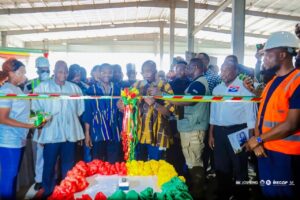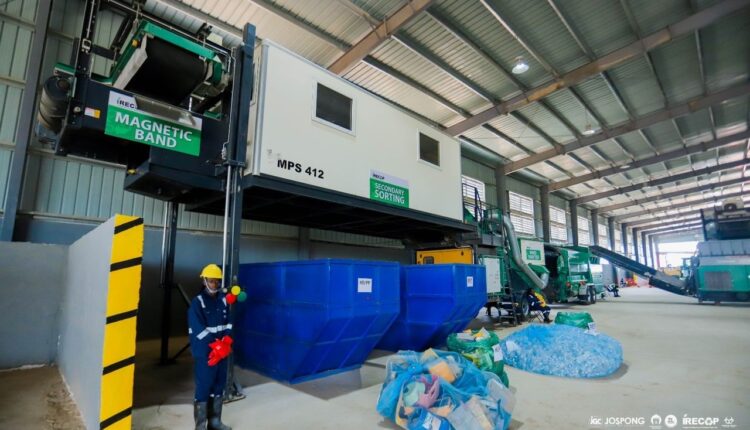The Vice President Dr. Mahamoud Bawumia has commissioned a 400-ton-per-day advanced integrated waste recycling plant in Kperisi, near Wa, in the Upper West Region.
This Zoomlion facility, known as the Integrated Recycling and Compost Plant (IRECOP), is the first of its kind in Northern Ghana and will process all types of waste from the region’s 11 municipal and district assemblies.
Dr. Bawumia highlighted the dedication of President Nana Addo Dankwa Akufo-Addo to revolutionizing Ghana’s waste management sector, referencing his extensive tours and sod-cutting ceremonies across the country in 2020.
He noted that the President’s toil has come to fruition since 10 out of the 16 recycling plants have been completed and commissioned including the Wa Integrated Recycling and Compost Plant (IRECOP).
He said the NPP government focused on social intervention initiatives under Nana Addo but is now going to concentrate on job creation.
He was particularly happy that the Executive Chairman of Zoomlion, Dr. Joseph Siaw Agyepong bought into President Akuffu-Addo’s vision and has constructed several IRECOPs across Ghana to transform the waste sector.
He commended the entrepreneur for standing tall in the waste industry to promote a circular economy for Ghana.
Dr. Joseph Siaw Agyepong, Executive Chairman of the Jospong Group of Companies, addressing the durbar of chiefs and people of the Upper West Region in Kperisi, detailed the company’s rise from humble beginnings with the support of all successive governments to a prominent waste management entity in Ghana and Africa.
Dr. Agyepong extended gratitude to past Presidents Agyekum Kufuor, Atta Mills, John Mahama, and the current President for their unwavering support in expanding Ghana’s waste management infrastructure.
He particularly commended President Akufo-Addo’s leadership in establishing regional waste treatment plants, which have become crucial in producing organic compost fertilizers amidst economic challenges.
Vice President Dr. Mahamudu Bawumia was also lauded for his advocacy for digitalization, which has encouraged entities like Zoomlion and its affiliates to streamline payments and services via digital platforms.
The waste entrepreneur said according to the United Nations Development Programme (UNDP), Ghana generates around 12,710 tons of municipal solid waste each day, 60% of which is organic.
He said the Kperisi-Wa Integrated Recycling and Compost Plant (IRECOP) will process this waste, creating around 960 bags of compost fertilizer per day, for a total annual output of more than 2 million bags from the 10 plants across Ghana to support the agricultural sector by supplying organic compost and supporting eco-friendly practices.
He said Zoomlion began in 2006 with a single manual tricycle and has since grown significantly, building multiple waste treatment plants across the country.
The new facility at Kperisi-Wa is expected to improve garbage management in the Upper West Region by serving the 11 Municipal, and District Assemblies.
Dr. Agyepong said in addition to the IRECOP plant, Zoomlion has established a Centralized Medical Waste Treatment Facility. The facility is equipped with modern Ecosteryl Microwave Treatment Equipment and can process up to 5,000 kg of hazardous medical waste per day.
This project ensures the safe and ecologically appropriate disposal of medical waste from healthcare establishments around the region.
He said his facility uses digital technology, allowing healthcare professionals to schedule waste pickups with a simple smartphone code, increasing service efficiency and client satisfaction.
The new plants according to Dr. Agyepong will generate significant employment, providing 300 direct and 1,000 indirect jobs locally.
Cumulatively, he said the ten facilities will create over 10,000 jobs in the plastics recycling and organic fertilizer sectors, adding that the plants will serve as research and training centers for academic institutions such as the SD Dombo University of Business and Integrated Development Studies (SD-UBDS) and various technical and educational colleges.
He informed the chiefs and people at the gathering that Zoomlion’s efforts have also been recognized internationally, with the Jospong Group receiving its first carbon trading authorization from the Government of Ghana, projecting significant environmental and financial benefits by 2030.
He said the facilities are also set to contribute to eco-tourism, educating school children and professional bodies about waste segregation and environmental conservation.
Dr. Agyepong extended his appreciation to various stakeholders, including government officials, traditional leaders, local contractors, and international partners like Komptech GmbH and Ecosteryl who are his organisation’s key partners.
He emphasized the collaborative effort required to achieve these milestones and thanked everyone involved for their unwavering support and dedication.
The new Upper West Regional Minister, Hon. Stephen Yakubu, expressed gratitude to Nana Addo Dankwa Akuffu-Addo the president of the republic, and Zoomlion Ghana Limited for the unending efforts to better a lot of Ghanaians especially the people of Upper West Region.
He said he was excited about the tourism potential and job creation the facility brings to his people and the fact that it is an avenue for research institutions in Ghana and across the world.
Deputy Minister of Sanitation and Water Resources and Member of Parliament for Sissala East, Hon. Amidu Issahaku Chinnia, emphasized that the project will provide sustainable employment for local communities and thanked the landowners for their contribution to the facility’s construction.
Background
Zoomlion Ghana Limited’s Integrated Recycling and Compost Plant (IRECOP) concept promotes sustainable waste management by transforming municipal solid waste into useful resources. IRECOP facilities were established as a result of research recommendations to meet the increasing waste creation mix in metropolitan and municipal areas.
They use advanced comprehensive and modern recycling and composting technology to convert organic waste into compost fertilizer and recycle non-organic materials.
Benefits include but are not limited to:
Environmental Protection: Reduces landfill use and pollution by recycling garbage and producing eco-friendly compost.
Agricultural Support: Provides organic fertilizer to promote soil health and agricultural output, hence promoting food security.
Economic Growth: Generates direct and indirect jobs, boosts local economies, and encourages green businesses.
Health Benefits: Ensures safe disposal of hazardous waste, lowering the health hazards associated with inadequate waste management.




Comments are closed.